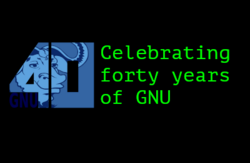Forty Years of GNU and the Free Software Movement
Original by the Free Software Foundation
Copyright © 2004-2023 Free Software Foundation, Inc. Privacy Policy.
This work is licensed under a Creative Commons Attribution-No Derivative Works 3.0 license (or later version)
On September 27, the Free Software Foundation (FSF) celebrates the 40th anniversary of the GNU operating system and the launch of the free software movement. Free software advocates, tinkerers, and hackers all over the world will celebrate this event, which was a turning point in the history of computing. Forty years later, GNU and free software are even more relevant. While software has become deeply ingrained into everyday life, the vast majority of users do not have full control over it.
Computer hackers and users from across the world will celebrate GNU's anniversary with special events. These include a specially convened GNU Hackers Meeting in Biel, Switzerland and a hackday for hackers of any skill level at the FSF's headquarters in Boston, MA.
On September 27, 1983, a computer scientist named Richard Stallman announced the plan to develop a free software Unix-like operating system called GNU, for "GNU's not Unix." GNU is the only operating system developed specifically for the sake of users' freedom, and has remained true to its founding ideals for forty years. Since 1983, the GNU Project has provided a full, ethical replacement for proprietary operating systems. This is thanks to the forty years of tireless work from volunteer GNU developers around the world.
When describing GNU's history and the background behind its initial announcement, Stallman (often known simply as "RMS") stated, "with a free operating system, we could again have a community of cooperating hackers -- and invite anyone to join. And anyone would be able to use a computer without starting out by conspiring to deprive his or her friends."
"When we look back at the history of the free software movement -- or the idea that users should be in control of their own computing -- it starts with GNU," said Zoë Kooyman, executive director of the FSF, which sponsors GNU's development. "The GNU System isn't just the most widely used operating system that is based on free software. GNU is also at the core of a philosophy that has guided the free software movement for forty years."
Usually combined with the kernel Linux, GNU forms the backbone of the Internet and powers millions of servers, desktops, and embedded computing devices. Aside from its technical advancements, GNU pioneered the concept of "copyleft," the approach to software licensing that requires the same rights to be preserved in derivative works, and is best exemplified by the GNU General Public License (GPL). As Stallman stated, "The goal of GNU was to give users freedom, not just to be popular. So we needed to use distribution terms that would prevent GNU software from being turned into proprietary software. The method we use is called 'copyleft.'"
The free software community has held strong for forty years and continues to grow, as exemplified by the FSF's annual LibrePlanet conference on software freedom and digital ethics.
Kooyman continues, "We hope that the fortieth anniversary will inspire hackers, both old and new, to join GNU in its goal to create, improve, and share free software around the world. Software is controlling our world these days, and GNU is a critique and solution to the status quo that we desperately need in order to not have our technology control us."
GNU Hacker's Meeting in Biel, Switzerland
On September 27, GNUnet e.V. is celebrating GNU's fortieth anniversary with a hacker meeting in Switzerland, which will feature presentations about various GNU packages, hacking, and making new releases. Among the speakers are Richard Stallman, the founder of GNU; Free Software Award winner Sébastien Blin of GNU Jami; the president of the Free Software Foundation Europe, Matthias Kirschner; and several GNU developers. There have been few if any other occasions where so many GNU maintainers will be present in person.
Hackday at the FSF Headquarters
In honor of GNU's fortieth anniversary, its organizational sponsor the FSF is organizing a hackday for families, students, and anyone interested in celebrating GNU's anniversary. It will be held at the FSF's offices in Boston, MA on October 1.
About the Free Software Foundation
The Free Software Foundation, founded in 1985, is dedicated to promoting computer users' right to run, edit, share, contribute to, and redistribute computer programs. The FSF promotes the development and use of free (as in freedom) software -- particularly the GNU operating system and its GNU/Linux variants -- and free documentation for free software. The FSF also helps to spread awareness of the ethical and political issues of freedom in the use of software, and its Web sites, located at https://fsf.org and https://gnu.org, are an important source of information about GNU/Linux. Donations to support the FSF's work can be made at https://donate.fsf.org.
More information about the FSF, as well as important information for journalists and publishers, is at https://www.fsf.org/press.
About the GNU Operating System and Linux
Richard Stallman announced in September 1983 the plan to develop a free software Unix-like operating system called GNU. GNU is the only operating system developed specifically for the sake of users' freedom. See http://www.gnu.org/gnu/the-gnu-project.html.
In 1992, the essential components of GNU were complete, except for one, the kernel. When in 1992 the kernel Linux was re-released under the GNU GPL, making it free software, the combination of GNU and Linux formed a complete free operating system, which made it possible for the first time to run a PC without non-free software. This combination is the GNU/Linux system. For more explanation, see http://www.gnu.org/gnu/gnu-linux-faq.html.
Media Contacts
Greg Farough
Campaigns Manager
Free Software Foundation
+1 (617) 542 5942

